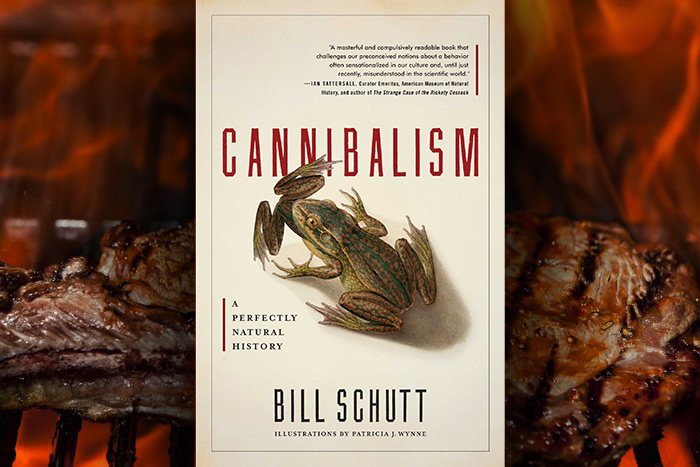Book Review: Bill Schutt's 'Cannibalism' Is a Chewy and Insightful Read

Algonquin Books released Cannibalism, A Perfectly Natural History by East Ender Bill Schutt last month to immediate acclaim. Schutt’s Dark Banquet: Blood and the Curious Lives of Blood-Feeding Creatures was named a Best Book of 2008 by Amazon and the Library Journal. Schutt has served as a vertebrate zoologist at the American Museum of Natural History, studying bats, as well as teaching biology at Long Island University (LIU) for almost 20 years (first at Southampton and now at LIU-Post).
Cannibalism is as entertaining as it is informative. Schutt examines the many facets of cannibalism with rare insight and perception.
He explores myriad reasons for cannibalism in the natural world as it relates to a wide variety of creatures. And he “brings home the bacon” regarding “long pig” (human) cannibalism. Spoiler alert: it doesn’t taste like chicken and it’s often paired with a tall pour of regret. Schutt flew to Dallas to engage in a bit of cannibalism himself via a placenta osso buco. Don’t judge—do you take a medication that contains dried and ground human organs? Medicinal cannibalism. Do you bite your nails? Autocannibalism.
As the book’s subtitle, “A Perfectly Natural History,” says, Cannibalism, in many of its guises is perfectly natural. The science is not at all fiction and the facts don’t point to a zombie apocalypse but to a long history of ingrained behavior. In fact, some creatures have evolved to cannibalize. As Schutt notes, the female black lace-weaver spider lays trophic, unfertilized, eggs for her young to consume and then, when the eggs are gone, invites her spiderlings to eat her own body. Many mammals consume their afterbirth to hide its scent and for sustenance.
Schutt traces the taboos surrounding cannibalism to ancient Greek legends and to Christianity, so the Christian belief in the transubstantiation of bread and wine in the Eucharist gets a special mention. Schutt demonstrates that people unfamiliar with western cultural norms do not view cannibalism as taboo. Some consume their dead—even the contents of their organs—out of respect. Though Europeans cast aspersions on cannibalism and enslaved entire populations on the excuse that these “savages” were cannibals, those who could afford it consumed specific human body parts. Epileptics lined up at public executions in hopes of sucking down some fresh blood as a curative.
Yes, Schutt investigates the story of the Donner Party. Yes, despite misleading media coverage in 2010, the Donner Party members did consume each other out of desperation. It was not, by any account, a fun party.
Cannibalism is a natural response to severe stress associated with famine, overcrowding and disease. According to Schutt, as a result of China’s attempted Great Leap Forward and the siege of Leningrad, cannibalism may have hit its historic zenith in the mid-20th century. We all hope it was the zenith. With the deterioration of Earth’s atmosphere and a rising population, is there bloody writing on the wall? Schutt says, “I’m not predicting an increase in cannibalism-related events, just stating that they’ve happened many times in the past because of famines, and these types of tragic occurrences are happening now and will likely become even more frequent in the future. If cannibalism results from these tragedies, the medical community will need to be prepared for cannibalism-related diseases like Kuru.”
Schutt continues, “My next fiction book, The Himalayan Codex, is a sequel to our recent thriller Hell’s Gate. As for the subject of my next nonfiction book, I’m working with my agent, editor, and close friend, the artist Patricia J. Wynne, to figure that out.”
Meet Schutt this Saturday, April 1 at Southampton Books, Southampton. Schutt will offer a discussion of Cannibalism and sign copies of his new book from 6 to 8 p.m. southampton-books.com.



